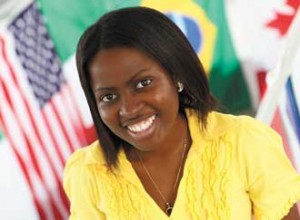
Sauvé Scholar committed to positive change for fellow Africans
By Jim Hynes
Idowu Ajibade’s newfound passion for enlightening her fellow Africans on the perils of climate change has earned the 27-year-old social activist from Lagos, Nigeria, admittance into Bill Clinton’s university. No, not Yale, where the 42nd president of the United States earned his law degree in 1973, but the Clinton Global Initiative University (CGI U).
CGI U builds on the successful model of the original Clinton Global Initiative, which called upon business and political leaders to make “commitments” to address global issues with practical, innovative solutions. The University version does likewise, working with college students and administrators instead. Both plans require participants to make “commitments to action,” by carrying out projects to improve the world in some way. The most recent commitments, announced by Clinton at a CGI U meeting in Austin, Texas, in February, included Ajibade’s pledge to address the knowledge gap on climate change in Africa. Ajibade was invited to the three-day meeting, where she attended a variety of workshops and plenary sessions and met some of the other participants and international guests.
The meeting convened approximately 1,000 college students and nearly 70 university presidents, as well as business leaders, representatives from non-profit organizations and other activists. Notable attendees included Paul Bell, President, Dell Global Public Inc; Blake Mycoksie, the founder of TOMS Shoes; Roy Steiner, Deputy Director, Bill & Melinda Gates Foundation; Margaret Mckenna, President, Wal-Mart Foundation; Zainab Saibi, President, Women for Women International; Jessica Bailey, Program officer, Rockefeller Brothers Fund; and Cheryl Dorsey, President, Echoing Green. Others on hand included NFL All-Star Nnamdi Asomugha (a Nigerian-American), the Daily Show’s John Oliver, actors Matthew McConaughey and Natalie Portman, and documentary filmmaker Morgan Spurlock.
“I got an email from the CGI U in January saying I’d been accepted to come to the meeting,” Ajibade said. “It was fantastic. I was really impressed with the organization of the meeting. President Clinton was there with us throughout the meeting. I particularly enjoyed a plenary session where young leaders and activists from different fields, business, NGOs, talked about what they’d been doing to improve the world.”
Ajibade, who came to Montreal in August 2008 to participate in the Sauvé Scholar program, is an independent researcher working to promote human rights and combat corruption in Africa. Before becoming a Sauvé Scholar, she was a Research Assistant at the International Council on Human Rights Policy in Geneva, Switzerland. Ajibade has also worked as a Development Consultant for the Leonard Cheshire Disability Foundation in West Africa, and as a Program Associate for the Freedom House Human Rights Reporting Project in Nigeria. She is a member UPEACE/US Alumni Advocacy Committee to the United Nations. She holds an MA in international law and human rights from the University for Peace, Costa Rica, and a BA (Philosophy) from Obafemi Awolowo University in Nigeria.
Ajibade’s CGI U commitment – Youth Environmental Activists Network for Africa (YEANA), offers a practical solution to the knowledge gap on climate change between Africa and the West, and also between climate change experts and non-experts in Africa. Together with environmental organizations in Nigeria, the network will train high school and college students on climate change and establish Green Clubs across universities in Nigeria. Ajibade hopes the project will be replicated in other parts of Africa.
Change of venue, change in focus
So how does someone who put so much time and energy into human rights issues suddenly take an interest in climate change in the first place? For Ajibade, the change in thinking was spurred by a change in her personal geography.
“When I came to North America, I noticed the momentum that climate change issues had gained in the media and in the public here. Before I got here, even though I was educated to a Master’s degree level, I wasn’t that knowledgeable about environmental issues,” Ajibade said. “I always saw it as not having an impact on me, not really my business. And I know that’s how a lot of African people see it. In my house, before coming here, we had a discussion about climate change and my mother said ‘could this be another conspiracy from the West?’ ”
But being here and seeing how concerned people are about it proved to her that climate change is not a conspiracy, but a reality, she said.
“It’s happening, it’s real. We are all walking around saying it’s a global world, but most Africans of my generation don’t know that the globe is warming, and those that do don’t take it seriously. Here, even young schoolchildren know about climate change, recycling or even just conserving energy. Meanwhile, we know that climate change will affect all people, all countries. And Africa, according to the Intergovernmental Panel on Climate Change, is the most vulnerable and the most ill-equipped and ill-prepared to face these challenges,” she said. So my project is really to get the African community to start discussing climate change in a serious and more meaningful way.”
For more information on Ajibade’s commitment, visit www.yeana.org
